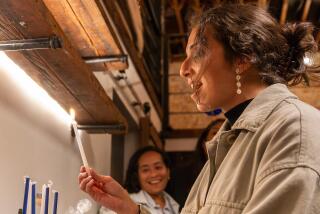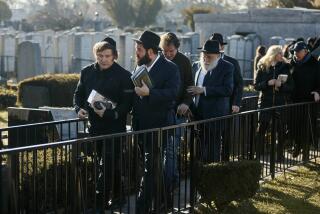22-Year-Old Studying to Become Cuba’s Only Native Rabbi
- Share via
NEW YORK — The traditions began with Abraham and they’ve been passed down faithfully for nearly 4,000 years. But they came close to dying out for a generation of Jews in Communist-controlled Cuba.
Fidel Castro never said they could not worship, but most of Cuba’s Jews fled the island after he took control in 1959. Many others gave up going to the synagogue and the island was left without a rabbi.
One man now hopes to become the only native-born rabbi in Cuba. David Said Levy, a 22-year-old telephone technician from Havana, began classes at Yeshiva University here Sept. 1.
Administrators at Yeshiva say he is the first Jew ever granted permission by the Castro government to study at a university in the United States.
Levy’s schooling was arranged by Barry Katz, a Jewish businessman from New Orleans. While in Cuba for the Pan American Games in 1991, Katz went to a synagogue in Havana and met Levy.
There are four synagogues but only about 800 Jews in Havana, down from about 13,000 in pre-Castro Cuba. Levy estimates there are only about 1,200 left in the country, which has a population of more than 10 million people.
A generation gap of sorts has emerged among Jews in Cuba. Levy, speaking English with the help of an interpreter, said most of the middle-aged Jews lost interest in religion but older people had continued worshiping. Cuba left the temples open and the people who used them maintained them.
In the last few years, Levy said, many young people began rediscovering their roots. Levy was one of several young Jews spending a lot of time in the synagogue when Katz visited.
“He was in the synagogue every day,” Katz said. “He really impressed me with his sincerity,”
Levy had even taken a position of responsibility in the Jewish community. An 80-year-old man taught Levy the ritual slaughtering techniques necessary to produce kosher chicken and beef.
Before Levy left for New York, he taught the techniques to his younger brother so there could continue to be kosher meat in Cuba.
“There is no one in Cuba to do the circumcisions, or burials or to teach,” Katz said. “He had a sincere interest in becoming a rabbi and serving his community.”
The Cuban government was willing to let Levy leave if he could get a commitment from a rabbinical school. Katz, a 45-year-old real estate investor, knew some people at Yeshiva University so he called the admissions director and the head of the school’s Sephardic Studies department.
“They said if I could get the young man out and get him to America, they would give him a scholarship and help him become a rabbi,” Katz said.
It was two years before a visa could be arranged and Levy brought to this country, time that Levy used to study on his own.
“In two years, he was able to learn how to read the Torah, which is in Hebrew. That’s pretty difficult to do,” Katz said. “In New Orleans, the rabbi at my congregation said (Levy) was able to read and speak Hebrew at a high school level, which is amazing because there is no one to teach Hebrew there.”
Levy’s adviser, Rabbi M. Mitchell Serels, said Levy is a solid student. His English has improved steadily but if he ever gets lonely for Spanish, he need only walk a block. The campus, at the northern end of Manhattan, is in the middle of a Latino neighborhood.
Many of Levy’s classmates will become doctors and lawyers, but Levy says he is not tempted by the promise of life in the United States. “My promise was to return.”
More to Read
Sign up for Essential California
The most important California stories and recommendations in your inbox every morning.
You may occasionally receive promotional content from the Los Angeles Times.













